Curious about following the world’s best diet, while eating delicious food and never feeling hungry? There are many reasons the US News and World Report recently selected the Mediterranean diet as #1 among the 40+ diets they examined. In today’s post, we dig into this important question: What is the Mediterranean diet and how to follow it?
I put together a simple and complete resource that will help you start and enjoy this delicious way of eating. And be sure to check out my top 50+ Mediterranean diet recipes.
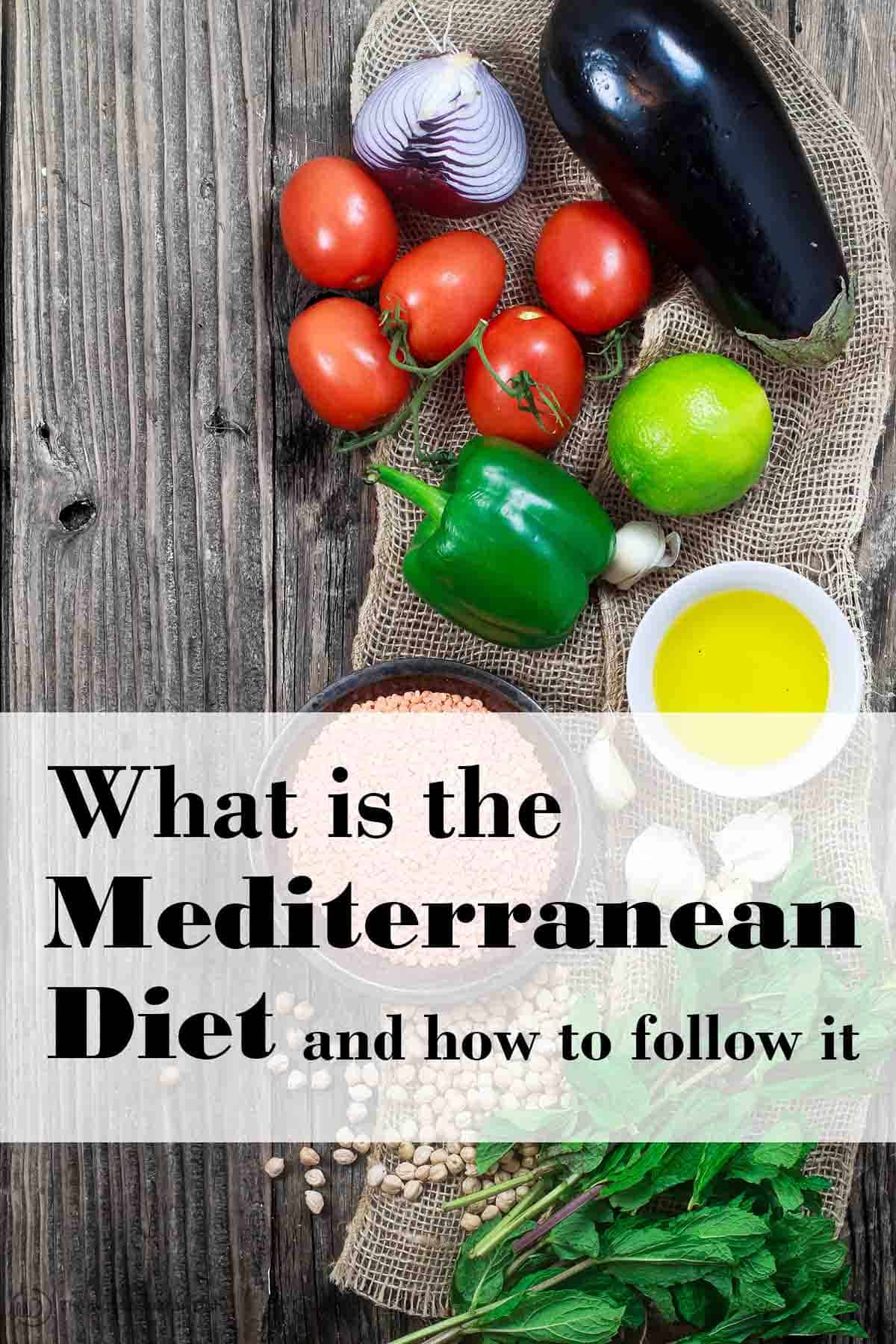
What is the Mediterranean diet?
The Mediterranean diet or way of eating is a plant-heavy diet that focuses more on vegetables, fruits, whole grains, beans, nuts and legumes with some lean proteins from fish and poultry, and good fats from things like extra virgin olive oil. As you see at the very top of the Mediterranean diet pyramid are red meats and sweets which are enjoyed less frequently.
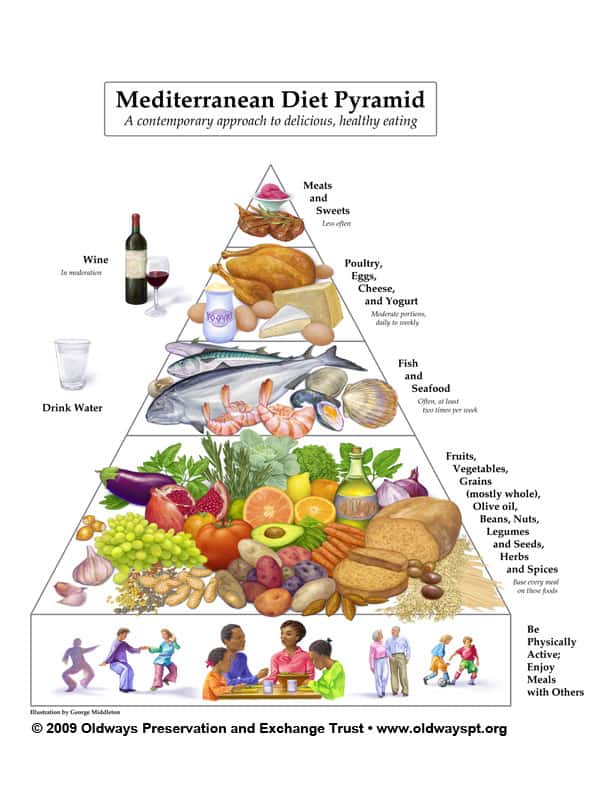
Not a diet, but a sensible way to eat…
The word “diet” comes with certain assumptions–a set of rigid rules to follow that may have you counting calories and avoiding food groups that your body needs. Thankfully, that is not what you’ll find when eating the Mediterranean way.
As Oldways expert Kelly Toups, MLA, RD, LDN, explained: while many diets in the common sense of the word are rooted in deprivation, the Mediterranean diet is a joyful way of eating that celebrates good foods, while keeping a strong focus on flavor and the pleasure of the table.
What do you eat on the Mediterranean diet?
- Eat MORE (every day) leafy greens, vegetables, fruits, whole grains, beans, nuts, and legumes.
- Eat MODERATELY (weekly) lean proteins from fish, some poultry, and eggs.
- Eat LESS Red Meats and Sweets. Red meat is consumed less frequently and also in smaller amounts. a
- Use Extra Virgin olive oil regularly.
- Avoid processed foods, too much sugar, and any products with a list of ingredients you don’t understand or can’t read very well.
Advice for beginners
If you’re brand new to eating the Mediterranean way, expert Kelly Toups, MLA, RD, LDN says, “begin with simple swaps.”
- The first week, buy some quality extra virgin olive oil and start using olive oil as your primary cooking oil (in place of butter, lard or other oils).
- The next week, try and incorporate 1 or 2 fish or seafood based meals, and/or 1 or 2 meatless meals. Stock up on healthy snacks and items like hummus and veggies, as well as fresh or dried fruit.
- For dessert, replace that piece of cake with a fruit or a handful of dried fruit like apricots, figs, or cherries next to a small piece of traditionally produced cheese like feta, Parmigiano-Reggiano or Pecorino Romano.
7 ways for how to follow the Mediterranean diet (Recipes Included):
- Eliminate fast and processed foods. For many of us living in America, this is one of the tougher adjustments and may take some time. To start with, try swapping a fast-food meal with a homemade one. For example, if it’s chicken wings you crave, make them Greek-style like in this recipe! Or if it’s sweet potato fries (my personal guilty pleasure), try baking them in olive oil with a sprinkle of Mediterranean spices like in this recipe. And so on! The point is, find a healthier homemade alternative to your favorite fast foods.
- Eat more vegetables, fruits, grains, and legumes. The base of the Mediterranean diet pyramid should make up the base of every meal. When you can, opt for vegetarian entrees like this Cauliflower and Chickpea Stew or Spicy Spinach and Lentil Soup. Rely more on satisfying, flavor-packed salads to make up a good portion of your plate. Some ideas: Kindey Bean Salad; Mediterranean Chickpea Salad; Greek Salad; Balela Salad.
- Swap fats. Rely on healthy fats. A good place to start is to swap your butter with good olive oil in your cooking.
- Reduce your intake of fatty red meats…a lot. Eat more lean proteins–fish about two times a week; and poultry in moderation. A few favorites are this Easy Baked Salmon; Shrimp Skewers; One-Pan Halibut and Vegetables; Mediterranean Grilled Chicken; and Egg Shakshuka!
You can certainly still eat red meat on occasion (very limited), but choose leaner cuts. Lamb is often the red meat of choice in Greece and other Mediterranean countries. You might like to try: Kofta Kebobs; Grilled Lamb Chops with Mint Quinoa; or Moussaka (Greek eggplant and lamb casserole). For special occasions, I highly recommend Leg of Lamb with Potatoes. - Eat some dairy and eggs. Consumption of dairy products (in moderation) provides health benefits including lower risk of diabetes, metabolic syndrome, cardiovascular disease and obesity. Sadly, according to USDA, more than 80 percent of the entire U.S. population does not meet the daily dairy intake recommendation! We are not talking about topping everything with loads of processed cheese. But perhaps for a snack, swap your chips for a low-fat Greek yogurt. Add a sprinkle of feta cheese to your salad, or swap mayonnaise or your sandwich spread for low-fat Tzatziki sauce.
- Do not drink your calories. In the Mediterranean diet, this translates to drinking more water and swapping calorie-laden Margaritas for an occasional glass of red wine.
- Share as many meals with others as possible. This helps in several ways. Spending time with loved ones reduces stress and elevates our moods. But being deliberate, and slowing down to socialize with others also allows us to control our portions.
Mediterranean diet recipes & other resources
To help you get started, here are some important resources:
- 50+ Top Mediterranean diet recipes
- Mediterranean diet breakfast
- Mediterranean diet shopping list
- Mediterranean diet food list: 5 foods you need
VISIT OUR ONLINE SHOP FOR QUALITY OLIVE OILS, ALL-NATURAL SPICES AND MORE
*This post originally appeared on this site in 2017, it has been revised and reposted with new media and information for readers’ benefit. A special thanks to Oldways and Kelly Toups, MLA, RD, LDN for lending expertise. Readers assume full responsibility for consulting a qualified health professional regarding health conditions or concerns before starting a health program, new way of eating, or diet.
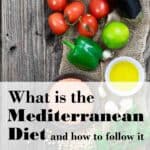
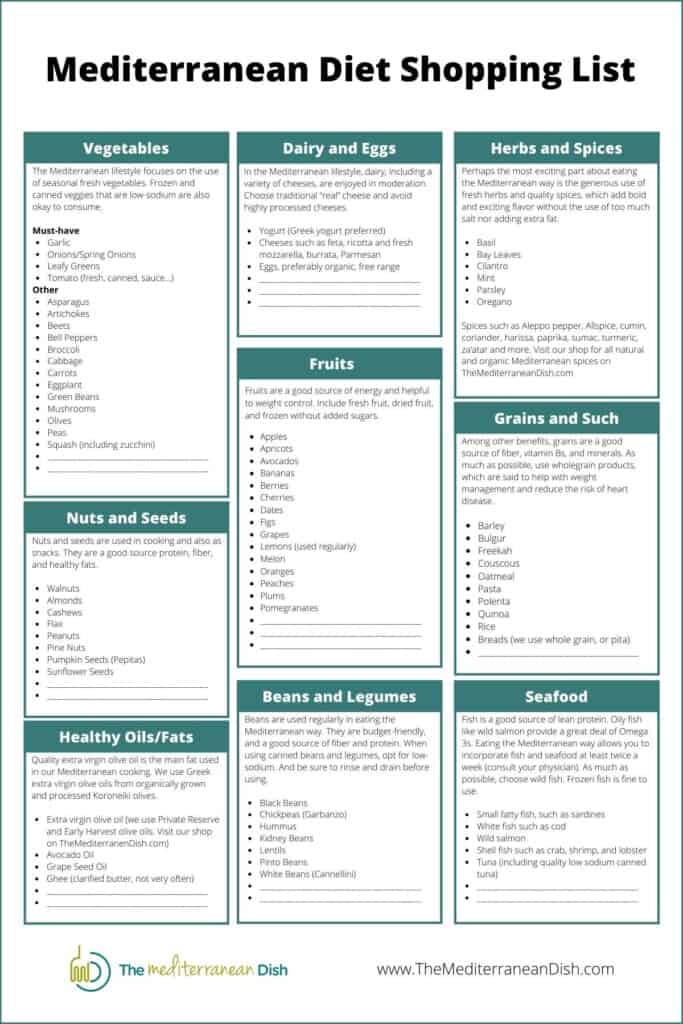
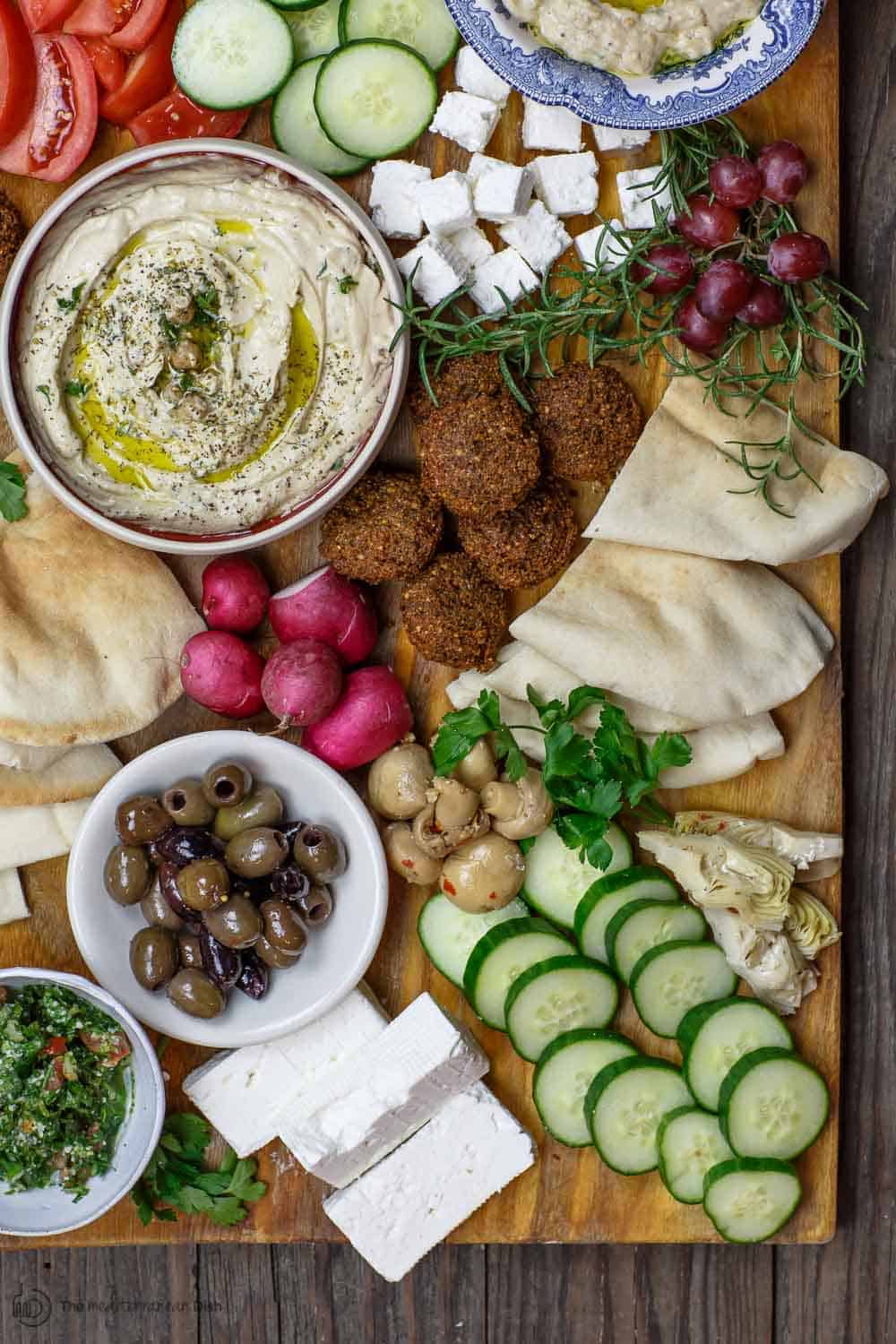
Hi, I recently found your blog and enjoying trying out the healthier recipes. I was going to order some of the spices and the tahini paste, however I don’t see an option for Canada? Do you only ship to US ?
Hi, Betty! Unfortunately, we only ship within the US at this time.
In Canada you can order spIces from Silk Road Spices in Calgary. Or if you have a mid-east food market nearby you can get the spices and the tahini from there. Some larger grocery chains such as Loblaws carry these as well.
My son is allergic to milk protein. Is it still possible to follow this way of eating, dairy-free?
Hi Jill, yes, while we do consume some dairy on the Mediterranean diet, it is easy to eliminate and the majority of the recipes on our site are dairy-free.
How can i follow Mediterranean diet if I am allergic to seafood, wheat, gluten and dairy? I try and keep low carb as possible also because my goal is weightloss.
Thank you for sharing, Sue. In eating the Mediterranean way, you can rely far more on vegetables and legumes, if you can’t have seafood and wheat. But you are best off chatting with a professional dietitian to help you tailor this diet to your very specific needs.
So excited to come across your site! I’m in search of a good hummus recipe and am finding fresh tahini, as in anytihng really, homemade fresh is best. But I am curious about your olive oil…where does it come from? Looking forward to eating my way through your recipes!!
Thank you!
Hi Carrie! Thank you for stopping in. Glad you found our site too. Our olive oils come from two groves in Greece. You can read more about each of them here:
https://shop.themediterraneandish.com/product/private-reserve-extra-virgin-olive-oil/
https://shop.themediterraneandish.com/product/early-harvest-extra-virgin-olive-oil/
Suzy – why 2 different oils? Is one recommended above the other for certain foods or dishes? Thanks so much for sharing your beautiful recipes and knowledge with us.
We use mostly extra virgin olive oil for most recipes.
Thank you so much, Suzy! I love your recipes and your outlook on food. This is helping me make so healthy changes in my life.
That’s awesome, Helen! Thank you!
Honestly, you are the entire reason I am eating Mediterranean food and I am not just saying that to be nice. I am from the south and we tend to eat very heavy, unhealthy foods. Your newsletters and corresponding recipes have transformed how I cook and the way I see food. Thanks for sharing your passion to the masses. We appreciate you even when you don’t even know it!
I am so honored to hear this, Ashley! Thank you.
I just discovered the webstie and it looks to be very helpful. Thank you for your work and help in providing the public with great resources. I have been looking for ways to add more fruits and veggies. Plus, incorporate anti-inflammitory foods. Currently, my family doesn’t eat very much red meat. Our meat of choice is primarily ground turkey and chicken. However, seafood seems to be a huge part of the Mediterrnean diet. I do not like seafood at all. I have tried seafood several different ways and I just can’t eat it. Out of the 6 people in our family 2 of my children will eat seafood. My husband will occasionaly eat salmon but not much else in the way of seafood. Any suggestions? I really wish I did enjoy seafood. Thank you
Hi Desiree, thank you so much for reaching out. I’m glad to have you here. There is quite a variety of foods within the Mediterranean diet, so if you are not able to enjoy fish and seafood, perhaps you’ll end up focusing more on vegetables, fruits, grains, legumes which are a great source of plant-based protein. And you can obviously enjoy chicken and turkey as another source of protein.
Hello. Great looking recipes.
Could you please share what you would eat in a day as an example? I understand if Not exact amounts because everyone’s needs different but a general idea of what in a day or do u just pick a breakfast , a lunch , a dinner from your recipes ?
Thanks 🙂
Hi Emma, like you said, there are no set quantities or rule in eating the Mediterranean way, and the focus is more on the overall pattern of eating. If you search our recipes archive page you’ll see a category for breakfast, entrees, seafood, etc. It would be easy to pick something from the different categories following the eating patterns outlined here. For example, on a weekday morning, I might have a hummus toast for breakfast, hearty salad for lunch, and fish with a side of veggies and grains for dinner. Hope this helps. There is also an article on Mediterranean diet snacks that might also be helpful: https://www.themediterraneandish.com/best-mediterranean-diet-snacks/
All these foods are Mediterranean? Wow! The video in your blog makes my mouth water. I want to try to cook this sometimes and let my family eat these kinds of healthy food, plus I read that it helps for those whos in diet and helps as well for the gut this is amazing!
Thank you! Glad to hear it!
We are in our 70’s and need this for our health and weight loss. This site gave me just the knowledge I needed to begin our journey into the Mediterranean way of eating healthy.
Awesome! Can’t wait to hear what you make!
Thanks so much for sharing this very important information about Mediterranean Diet , Looking forward to stating the diet soon.
Welcome to The Mediterranean Dish! Enjoy!
Hi there, I am just starting and already made one of your recipes which is delicious ! Is there anywhere that references portion sizes ?
Thank you, Emily! We do provide the number of servings on the nutrition label.
themediterraneandish it is a great place for good advices ,it was helpful for me i recommend this website for every one to want to live in healty way ,and stay in good shape
James, thank you so much! I am so glad our site is helpful to you!
Love Mediterranean Eating. Thanks for all the wonderful recipes.
What kind if bread is preferable?
Bernice, there really are no do-s and don’ts necessarily. But for the most part, whole grain and whole wheat bread are recommended. I’ll tell you though, I eat other breads in moderation.
At the risk of repeating…I am one of those people that needs an exact list of what to eat daily…. in other words can you spell out what I should eat each meal? You know like a 7 day sample eating plan? Even general helps. Thanks!
Hi Courteney, thanks for sharing. I can appreciate where you are coming from, but that is not how eating the Mediterranean way works because it is not a “diet” in that very traditional sense with a list of things to eat and a list of things to avoid. The pyramid provided here is the best guide as far as I’m aware. When planning meals, we focus more on the bottom of the pyramid–vegetables, grains, fruits–and lean proteins, fish and seafood. We use extra virgin olive oil for cooking fat. If you’re looking for a list of things, the best option would be work directly with a trained dietion or nutritionist who would be better qualified to assist you and help draft something that is best suited to your needs.
Most of our recipes here will work for someone pursuing eating the Mediterranean way, you can browse our recipes here: https://www.themediterraneandish.com/recipes/
Your recipes are so delicious. I love them because I can throw them together quickly and some are lovely cold to eat as left overs. Your blackened salmon is great and guests love it. I cooked it last night as a guest in a relatives kitchen with baked vegetable new potatoes, and steamed runner beans and mini broccilli. I forgot to buy salsa ingredients and it was still delicious and they only had smoked salmon.. Delicious!!!! Great for guests.
So happy to hear it, Bridget! Thank you for sharing!